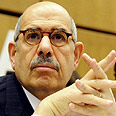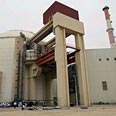
'Iranians gather around regime.' ElBaradei
Photo: AFP

Iranian nuclear plant in Bushehr
Photo: AP
"We haven't really moved one inch toward addressing (Iran's nuclear ambitions)," Mohamed ElBaradei, director-general of the International Atomic Energy Agency (IAEA) was quoted by the LA Times as saying.
International Dialogue
Roni Sofer
Talking to Israeli reporters in Brussels, Jaap de Hoop Scheffer says he hopes international dialogue will yield solution to Iranian nuclear issue. North Atlantic Treaty Organization has no plans to get involved in Israeli-Palestinian talks, he adds
According to the report, published Saturday, the IAEA chief considers five years of US and international efforts to rein in Iran's nuclear ambitions a "failure", as Tehran moves ever closer to obtaining the means to develop weapons of mass destruction.
ElBaradei told the LA Times he felt optimistic about an eventual US-led settlement between Tehran and the West.
The 66-year-old Egyptian diplomat and 2005 Nobel Peace Prize laureate said US President-elect Barack Obama gave him "lots of hope" after he inserted a proposal to abolish all nuclear weapons in the Democratic Party platform and advocated opening diplomatic dialogue with rivals.
"He is ready to talk to his adversaries, enemies, if you like, including Iran, also (North) Korea," ElBaradei said, adding that the Bush administration was reluctant to do so. "To continue to pound the table and say, 'I am not going to talk to you,' and act in a sort of a very condescending way - that exaggerates problems."
According to the LA Times, some Western diplomats accuse the IAEA of not being tough enough on the nuclear ambitions of countries such as Iran, Syria and North Korea.
Mark Fitzpatrick, an arms control expert at the International Institute for Strategic Studies in London told the newspaper that "from a Western perspective, he's been too quick to give the benefit of the doubt to Iran and shade his reports sometimes in ways that sometimes downplayed Iran's violations and lack of cooperation."
'Different shades and colors in Iran'
Other experts, according to the report, said ElBaradei has walked a tightrope of criticism from both Iran and US allies such as Israel.
During his interview with the LA Times, the head of the nuclear watchdog said that in retrospect, the sanctions may have led to "more hardening of the position of Iran.
"Many Iranians who even dislike the regime (are) gathering around the regime because they feel that country is under siege," he said.
ElBaradei continued to say that one hope of a diplomatic solution was for the US and Iran to meet to begin talking, not just about nuclear technology but also about grievances that stretch from the 1950s, when the US helped overthrow a democratically elected government, to the present, when Iranian and American surrogates vie for supremacy in several Middle East battlegrounds.
He further argued for a "grand bargain" between the West and Iran that recognizes Tehran's role in the region and gives it "the power, the prestige, the influence" it craves.
According to the LA Times, ElBaradei brushed aside the argument of some US analysts who describe Iran as a messianic state determined to obtain nuclear weapons to launch a war against its archnemesis, Israel.
"When I go to Iran I see . . . that there are all different shades and colors in Iran, from atheist to religious zealots," he said. "So Iran is no different than any other country. I mean, they are connected with the rest of the world."















